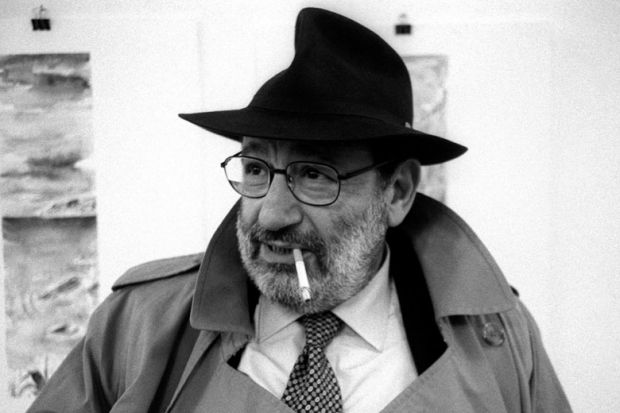These seem to be very bad times for graduate research students in the arts and humanities, the intended audience for this book. The job market is not great; funding is scarce; casualisation, which might appear to serve grad students but actually exploits them, proceeds apace; the smooth, high walls of the ivory tower seem ever more exclusive and imposing; the groves of academe (odd, I’ve always thought, to have groves inside a tower) ever more remote. Even from the pages of Times Higher Education, our little world’s local paper, opinion pieces declare that, to prevent them getting “exalted notions of themselves” (forfend!), researchers in the arts and humanities should realise that they are simply “trainspotters in their field” about whom no one cares (wait: trainspotters in a…field?). Instead of doing research, it’s argued, they should simply teach, concentrating, as Jorge of Burgos demands, in Umberto Eco’s bestselling 1980 novel The Name of the Rose, on “the preservation of knowledge” or at best “a continuous and sublime recapitulation” of what is known.
Into this bleak picture comes the first English translation of Eco’s How to Write a Thesis, continuously in print in Italy since 1977. That was a long time ago in academia, and, at first sight, lots of this book looks just useless, rooted in its historic and specific Italian context. Who uses index cards any more? (I mean, I used to, but I wrote my PhD on a computer with no hard drive, using 5¼-inch diskettes, when the internet was still for swapping equations at Cern or firing nukes at Russia.) Who has typists copy up their thesis? The sections on using libraries and research sources sound like an account of a lost, antediluvian culture.
But.
Just before we throw this book away, or donate it to some dusty museum of intellectual life along with the doctoral theses and career hopes of our graduate students, let’s do what it is that we humanists are trained by our research to do: not just recapitulate what “we all know”, but – you remember – go a little slower, read a bit closer, look deeper, think more. It’s then that we can see the reasons for the publication of this book, in this clear and easily read translation by Caterina Mongiat Farina and Geoff Farina. Indeed, once some of the dust has been gently blown from the pages (and this itself is a useful research exercise), we realise that How to Write a Thesis is full of friendly, no-bullshit, entry-level advice on what to do and how to do it, illustrated with lucid examples and – significantly – explanations of why, by one of the great researchers and writers in the post-war humanities.
Most of the advice is gloriously practical: how to organise your primary resources; lists of common academic abbreviations (of course, some are easily fig. ed. out: others are harder; cf., passim, etc); how to and why to narrow down a topic (because “the rigour of a thesis is more important than its scope”); why it’s not only normal but productive to keep revising the contents and structure of your thesis; how to avoid being exploited by your advisers; how to reference; why you should check the sources of other people’s quotations. More, too, in this dense book. Eco explores common traps: for example, the “alibi of photocopies” (and, we can add, scans, PDFs and so on) (“there are many things I do not know because I photocopied a text and then relaxed as if I had read it”). He stresses how “the capacity to identify problems, confront them methodically, and articulate them systematically in expository detail” in a thesis is vital for employment outside universities (“transparency about transferable skills”, ugh, we might say). And while index cards themselves may be antiquated, the idea behind having files for bibliography, quotations, what to read and ideas that strike you is not. Best of all, the absolutely superb chapter on how to write is worth triple the price of admission on its own. Do not photocopy or scan this section (it’s pp. 145-184, by the way).
While lots of the advice is hands-on (“begin new paragraphs often”), some is more metaphysical. Writing a thesis involves learning academic humility, the “knowledge that anyone can teach us something”. Eco illustrates this with a beautiful story of how a chance remark in a century-old book, badly written and full of preconceived ideas, by Vallet, an abbot, gave him a vital insight for his own thesis. And then, demonstrating the complex ways that work and intellectual inspiration are related, he tells of discovering years later, on returning to the book, that while the insight was not there on the page at all, somehow, as a student, he had himself taken it from the book: “is this not also what we ask from a teacher, to provoke us to invent ideas?” Conversely, Eco suggests that in writing, one should have a degree of pride: on “your specific topic, you are humanity’s functionary who speaks in the collective voice. Be humble and prudent before opening your mouth, but once you open it, be dignified and proud” (or, if this is too much, at least “do not whine and be complex-ridden, because it is annoying”). Most of all, undertake a thesis, he says, with gusto, with enjoyment: it is not a “meaningless ritual” but something more.
The “something more”, without Eco ever declaring it, is the true subject of the book: learning, through the concrete practicalities of writing a thesis, the virtues that research teaches us. The philosopher Bernard Williams argued that the “authority of academics” must be rooted in the virtues of accuracy and sincerity: academics “take care, and they do not lie”. It’s true that understanding how these virtues apply in the arts and humanities is more complicated than in some areas of university research, in part because, in our constant dialogue about humanity’s ever-changing self-understanding, terms such as “truth”, “sincerity” and “virtue” are part of the dialogue and not fixed points. But the virtues are there, and one way – one very good way – to learn them is by writing a thesis. So, How to Write a Thesis is really: how to be an academic.
This is part of the answer to those who think that focusing on research makes us bad teachers: at their very deepest roots, both research and teaching in universities rely not only on subject knowledge but on the virtues of sincerity and accuracy, taught through research. But there’s more: the paradox – brought into sharp focus by How to Write a Thesis – that even with a PhD, you never properly qualify. Even eminent professors remain, in a way, students for ever, with more to research, more to explore just over there. And the surprising fact is that the people who remember daily the experience of doing research, who know that despite their degrees, titles and fancy hats, they, too, are really only students: these are the best people to teach other students. Whisper it – it’s not politic to say it aloud – but that’s what makes universities special places. Our graduate students intuit this, so help them scale the tower’s walls (so as to toil in the incongruously situated groves) by giving them this book.
Robert Eaglestone is professor of contemporary literature and thought, Royal Holloway, University of London. In 2014 he won a National Teaching Fellowship Award.
How to Write a Thesis
By Umberto Eco
Translated by Caterina Mongiat Farina and Geoff Farina
MIT Press, 256pp, £13.95
ISBN 9780262527132
Published 24 April 2015
The author

First published in 1977, linguist and philosopher Umberto Eco’s Come si fa una tesi di laurea: le materie umanistiche is now in its 23rd edition in the original Italian. It has been translated into 17 languages, including Farsi, Russian and Chinese, and now finally into English as How to Write a Thesis.
Eco, who is president of the Scuola Superiore di Studi Umanistici at the University of Bologna, was born in 1932 in Alessandria in Piedmont, northern Italy. He studied medieval philosophy and literature at the University of Turin, where he would later lecture. His first book, Il problema estetico in San Tommaso (1956), drew on his own doctoral thesis.
In addition to the acclaim that has greeted his scholarly work, Eco’s fiction has brought him widespread popular recognition, most notably with The Name of the Rose (1980) and Foucault’s Pendulum (1988). His latest novel, Numero Zero, will be published in English in November.
He observed to the Harvard Crimson that he “started by considering myself a scholar who worked six days a week and wrote novels on Sundays. And I thought at the beginning that there was no relationship between my novels and my academic work. Then, reading critics, [I saw that] they found connections.”
Asked in a recent New York Times interview about his legacy, Eco said: “Every writer, every artist, every musician, scientist is profoundly interested in the survival of his or her work after their death. Otherwise they would be idiots.
“Do you believe that Raphael was not interested in what happened to his paintings after his death? It’s another side of the normal human desire to survive personally in some way…[it] is essential if you work on something creative to have this hope. Otherwise you are only a person doing something to make money, to have women and champagne.”
Eco’s dry wit has supplied countless well-loved quips. A number of them, in a variety of languages, have been obligingly assembled on the author’s own website.
Karen Shook
Register to continue
Why register?
- Registration is free and only takes a moment
- Once registered, you can read 3 articles a month
- Sign up for our newsletter
Subscribe
Or subscribe for unlimited access to:
- Unlimited access to news, views, insights & reviews
- Digital editions
- Digital access to THE’s university and college rankings analysis
Already registered or a current subscriber? Login





